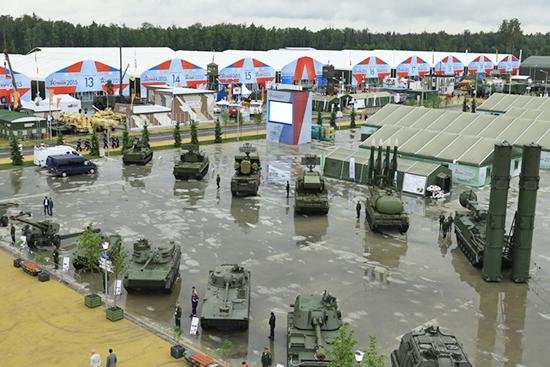President Vladimir Putin said on Tuesday that Russia was concerned about an anti-missile defense system near its borders, after announcing that Russia would add more than 40 intercontinental ballistic missiles (ICBM) to its nuclear arsenal this year.
“We will be forced to aim our armed forces … at those territories from where the threat comes,” Putin said.
Putin made his comments a day after Russian officials denounced a U.S. plan to station tanks and heavy weapons in NATO member states on Russia’s border. Putin said it was the most aggressive act by Washington since the Cold War a generation ago.
Putin, the Patriot

Putin opens ‘military Disneyland’ near Moscow
KUBINKA , Russia, June 17 (UPI) — Russian President Vladimir Putin opened “Patriot Park,” a military theme park funded by the Russian Defense Ministry.
The 15,000-acre park, a hour away from Moscow in Kubinka, will be completed by 2017 featuring hotels, conference centers and a residence for Defense Minister Sergey Shoigu. A massive assortment of military hardware will be on display on which children can climb and play.
U.S. Secretary of State John Kerry said that Russia’s plans to buy more intercontinental ballistic missiles was concerning and could herald a return to the international hostility of the “Cold War.” “Nobody should hear that kind of announcement from the leader of a powerful country and not be concerned about what the implications are,” Kerry said in a teleconference Tuesday.
“Of course it concerns me, we have the START agreement (the nuclear arms reduction treaty between the U.S. and Russia) and we’re trying to move in the opposite direction,” he said.
Kerry said that, since the 1990s, there had been “enormous cooperation” in the destruction of nuclear weapons that were in the former territories of the Soviet Union.
Since leaving the hospital, John Kerry is even busier and that included making a phone call to his Russian counterpart:
Washington, Jun 16 (EFE).- U.S. Secretary of State John Kerry telephoned his Russian counterpart Sergei Lavrov on Monday, urging him to expedite implementation of the Minsk peace agreement and resolve the Ukraine conflict.
“Kerry urged Russia to seize the opportunity of upcoming meetings of the Trilateral Contact Group and its Working Groups to accelerate progress on implementing the Minsk agreements,” State Department spokesman John Kirby said in a brief statement.
The Trilateral Contact Group and its Working Groups, comprising representatives from Ukraine, Russia and the Organization for Security and Co-operation in Europe, or OSCE, favours a diplomatic solution to the conflict in East Ukraine along the Russian border.
However, renewed clashes between government forces and pro-Russian rebels in the Donetsk region in early June had made the viability of peace agreements doubtful.
The last peace agreement was signed in February.
Fresh clashes had erupted in Marinka, along the separation line between the warring forces, 20 kms (12 miles) west of Donetsk, the main separatist bastion.
A report by OSCE observers says the separatists launched the offensive while the government forces limited themselves to defense.
Kerry and Lavrov took the opportunity to also discuss the situation in Syria, Iran, Yemen and the Arctic Council, Kirby added.


